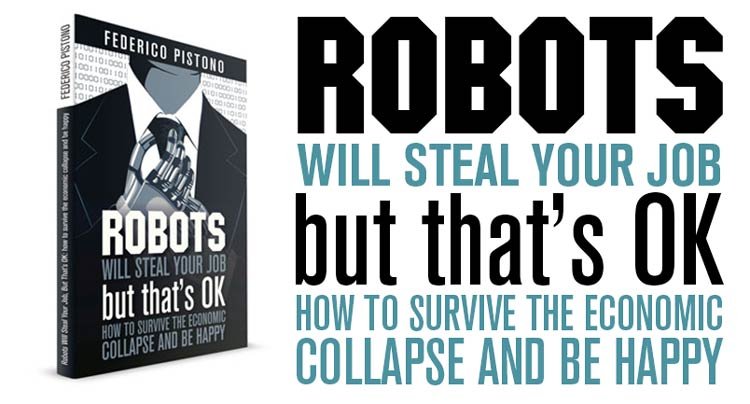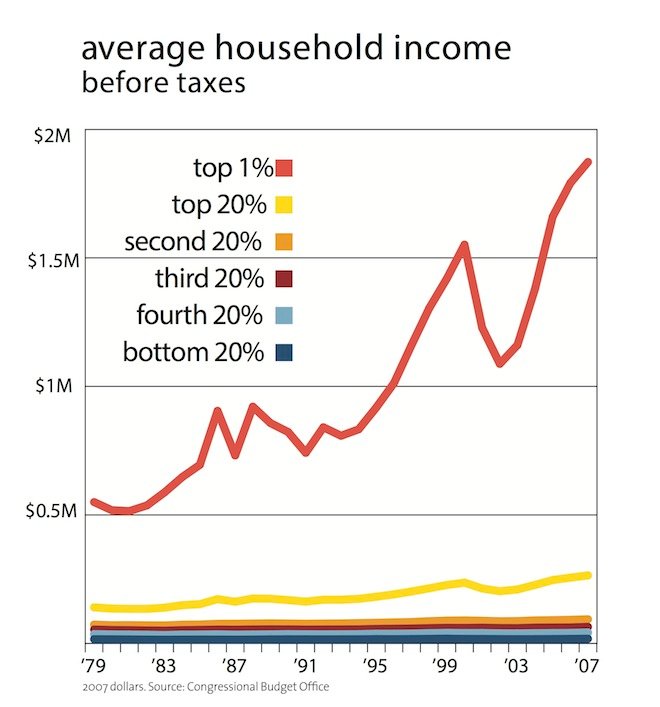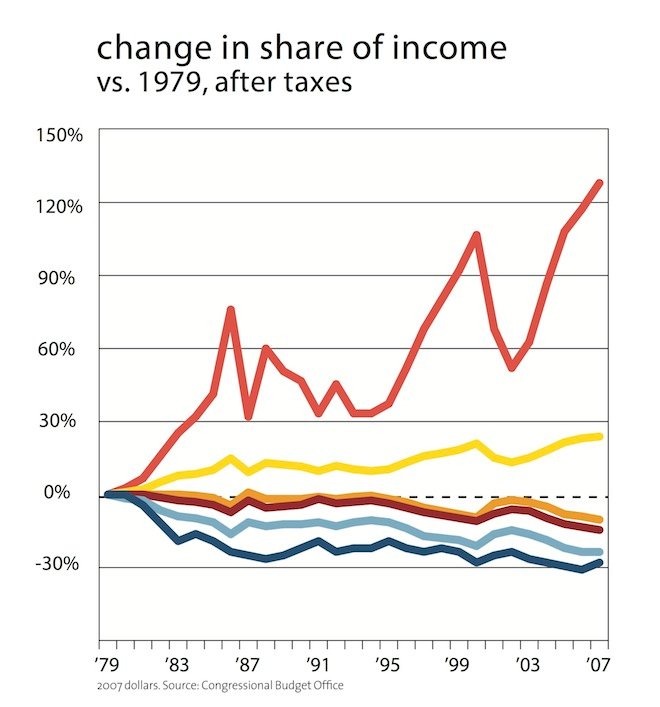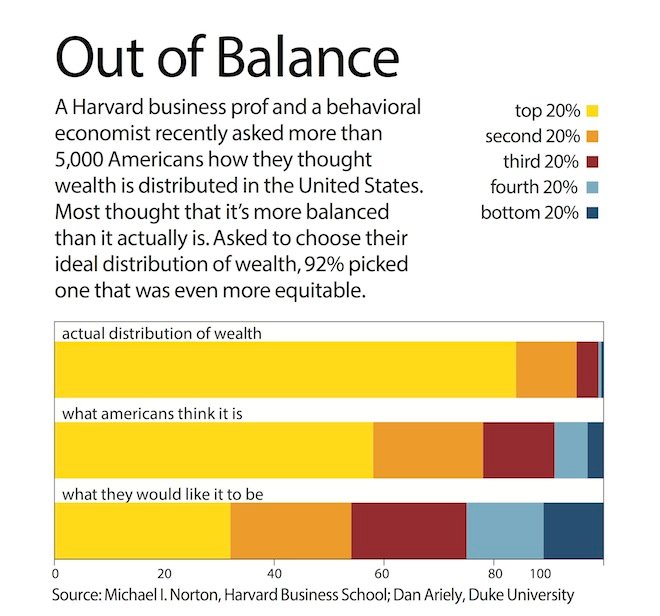Automation, AI, and the future of the economy are pretty hot topics these days. But I wrote about them 5 years ago, and people called me crazy. Now the book is an international success published in 6 languages, and I'm offering it for free as a special present to the Steem community. Happy reading!
What is this about?
When I embarked upon this project, back in October 2011, I eagerly set out on a journey to writing a book that would positively impact society. Even then I knew that to attain what I intended to achieve the readers of my book had to be able freely to access and share it.
 )
)
In my opinion, we are on the verge of a dramatic shift in society, one that will dwarf events even of the magnitude of the Industrial Revolution. As always, however, with the rising over the horizon of great possibilities come risks of equal scale. This book is my contribution to the global conversation on how we might go about building a better tomorrow.
Dedication
To all the great people who are dedicating their lives in making the world a better place for everyone.
To the emerging and growing zeitgeist of open science, open education, open culture, creative commons, and the free software movement. You are the heroes of this generation and you give us hope for the future.
Show your love and support
This is a full version of the book, completely free to read online. I'm posting the first chapter as follows, and you can read the rest here. Show your support by getting a copy on Amazon (Kindle/Paperback), iBookstore, PDF or ePub direct download. All files are rigorously DRM-free.
- Steem: upvote this post! :D
- Bitcoin: 1LeUniaxmEqYh6WJQ9ktuSYonkLG5HvcbZ
Preface
For years, I have been meaning to write a book, but could never bring myself to finish it. Whenever I became interested in a topic, it just opened up an entirely new and unexplored territory, which then lead to another universe of things to discover and understand. The more I searched, the more there was to be found. Every time I believed I had a decent understanding of a topic, something new would arise to challenge my previous assumptions. And so I was back to my studies again.
Maybe it is because I have a questioning nature and too many interests. Sticking to a particular topic for long can be an arduous task for me. In October, 2011, I was traveling throughout Europe, thinking about my future, and preparing a speech for my next conference when I finally decided it was time for change. During a rainy day when I was in Sweden I realised that my goal of a 1,000-page manifesto on how to fix society was unrealistic (and perhaps a bit megalomaniac). There were too many subjects, all were complex, and I just did not have enough time to tackle them all in one book. I decided that I would pick the most pressing issue and focus on that. Environmental sustainability and climate change came to mind, but there are already many excellent books on these subjects (from people much more qualified than myself). The future of technology and Artificial Intelligence was another, but the same conclusion applied. Then I realised that one of the most pressing issues we are going to face, both as individuals and as societies, is being deeply overlooked. Technology is displacing human labour.
Up until now, very few authors have addressed this issue. I was determined to fill this cultural gap. My audience would not occupy the ivory towers of academia – they would mingle in the vibrant crowds of the street. After all, the people most affected by this will be common workers and explanations of complex subjects in simple, concise, and understandable terms are rare. I promised myself I would create an accessible resource that would be of value to change-makers as well, be they politicians, technophilantropists, or CEOs.
One of the most difficult things for me was to decide what to include and what to leave out. I sincerely hope that I’ve found the right balance. This is a complex topic and my first book cannot be perfect. Your feedback, both positive and (especially) negative, will help me to improve it in future editions.
I hope this book will make you think about your future, guide you in understanding the world around you a little better, and help you navigate the endless sea of ever-changing wonders. And while you are at it, it might make you smile a bit and become slightly happier.
If I succeed in doing that, then the time and effort I put in writing this book was well spent.
Introduction
You are about to become obsolete. You think you are special, unique, and that whatever it is that you are doing is impossible to replace. You are wrong. As we speak, millions of algorithms created by computer scientists are frantically running on servers all over the world, with one sole purpose: do whatever humans can do, but better. These algorithms are intelligent computer programs, permeating the substrate of our society. They make financial decisions, they predict the weather, they predict which countries will wage war next. Soon, there will be little left for us to do: machines will take over.
Does that sound like some futuristic fantasy? Perhaps. This argument is proposed by a growing yet still fringe community of thinkers, scientists, and academics, who see the advancement of technology as a disruptive force, which will soon transform our entire socioeconomic system forever. According to them, the displacement of labour by machines and computer intelligence will increase dramatically over the next few decades. Such changes will be so drastic and quick that the market will not be able to abide in creating new opportunities for workers who have lost their jobs, making unemployment not just part of a cycle, but structural in nature and chronically irreversible. It will be the end of work as we know it.
Most economists discard such arguments. Many of them don’t even address the issue in the first place. And those who do address this issue claim that the market always finds a way. As machines replace old jobs, new jobs are created. Thanks to the ingenuity of the human mind and the need for growth, markets always find a way, especially in the ever-connected and globalised mass market we live in today.
In this book I will try to avoid picking either side based on belief, gut feeling, or hunch. Rather, I will attempt to engage in informed logical reasoning, based on the evidence we have so far.
The book is divided into three parts. First, we will explore the topic of technological unemployment and its impact on work and society – I chose to focus on the US economy, but the same argument applies to most the industrialised world. In the second part we will look into the nature of work itself and the relationship between work and happiness. The last part is a bold attempt to provide some practical suggestions on how to deal with the issues presented in the first two parts. Doing a thorough examination of each section would require a monumental effort, possibly resulting in thousands of pages, far exceeding the purpose of this book. My intention is not to write a complete academic report, but rather to initiate a discussion about what I think will soon be one of the biggest challenges that we have to face as a society and as individuals. Too often we treat various issues as separate subjects, not realising the interconnected nature of our reality. This mistake has made us weak and vulnerable. Over the last 70 years, we have set the stage of our own demise. We have become increasingly discontent, the quality of our relationships have diminished, and we have lost track of what really matters. Today, as the comedian Louis CK has noted: “Everything is amazing, and nobody is happy!” It is time to take a step back and think about where we are going.
Let us begin the journey.
Chapter 1: Unemployment Today
We usually get a sense of how good (or how bad) things are by reading the news and by looking at the world around us. We see how we live, we talk to our neighbours, we read newspapers, blogs, tweets, and watch TV. Very few people find the time to check for themselves the long and boring tables from the OECD Factbook, or the US Bureau of Labor Statistics. The business columns in newspapers are often filled with financial jargon, which does not really encourage a clear understanding to those who are not familiar with the intricacies of the economic system. As a result, most people do not have a clue about what is really going on. A quick glance at the recent statistics about job growth in the United States and in Europe should make us a bit concerned, to say the least.
In July 2011, the US Government released a report showing that 117,000 new jobs had been created that month, and the New York Times featured a promising headline “US Posts Stronger Solid Growth in July”.1 But, an ugly truth was hidden behind this veil of false hope. A growth of 117,000 jobs was not even enough to make up for population growth (about 130,000 people every month), let alone make a dent on the 12.3 million jobs lost during the 2008-2009 recession. Later in the article, we discover a few more things. The official figure for the unemployment rate was 9.1%, which is already staggeringly high, but it gets even more concerning when considering that an additional 8.4 million people were working part time because they could not find a full-time job, and 1.1 million had become so discouraged that they had stopped looking for work altogether. If we include these people, the broader measure of unemployment was 16.1% in July 2011. Please take a moment and let that sink in. The United States of America, possibly the wealthiest country in the world, had an unemployment rate at 16.1% as recent as July 2011.
As if that was not enough, it turns out that only 58.1% of the population was working, the lowest level in nearly three decades.2 Laura D’Andrea Tyson, Professor at the Haas School of Business at the University of California, Berkeley, calculated that even if we could somehow create 208,000 new jobs per month, every month, for the foreseeable future, it would still take until 2023 to fill that gap.3 In January 2012, thanks to massive efforts from both the private sector and the government, the unemployment rate fell to 8.3%.4 A very mild consolation, considering that people employed part-time for economic reasons, marginally attached to the labor force, discouraged workers, and the long-term unemployed changed very little over the year. To make things even worse, the labour force participation rate is 63.7%, its all time lowest since 1983, when women had not entered the work force in large numbers, and it is dropping consistently every year.5
MIT Economists Erik Brynjolfsson and Andrew McAfee make a lucid analysis of this problem in their book Race Against The Machine: How the Digital Revolution is Accelerating Innovation, Driving Productivity, and Irreversibly Transforming Employment and the Economy6, which deals with the current unemployment crisis and tries to offer some solutions, particularly by reforming education, the system of economic incentives, and by promoting entrepreneurship. While I concur with their analysis, I think their solutions are limited to the way things have worked until now. They appear to be assuming that the system of economic incentives, what drives people, and human nature itself are almost immutable. According to Voltaire, “Work spares us from three evils: boredom, vice, and need”, and having a job has undoubtedly been the driving force to combat them up until now. However, I challenge the assumption that this is the only way we can do that, and we shall explore why in the coming chapters.
Other authors have addressed the same issue. Jeremy Rifkin was one of the first to seriously consider this problem. In 1995 he published The End of Work: The Decline of the Global Labor Force and the Dawn of the Post-Market Era7, where he predicted that worldwide unemployment would increase as information technology eliminates tens of millions of jobs in the manufacturing, agricultural, and service sectors. He traced the devastating impact of automation on blue-collar, retail and wholesale employees: “While a small elite of corporate managers and knowledge workers reap the benefits of the high-tech world economy, the American middle class continues to shrink and the workplace becomes ever more stressful”8. While he may have gotten some of the details wrong, the general outline is so spot-on that it seems almost prophetic. Over the past twenty years we have witnessed the gradual disappearance of the American middle class, with rising costs and lower income910, while the wealthiest Americans have accumulated more wealth than ever before in history.
To get an idea of the disproportionate amount of wealth generated by the system, how unevenly distributed it is, and exactly how it had steadily become worse since 1979, let us look at the following graphs11.

Figure 1.1: Average Household Income
As you can see from Figure 1.1, average household income had remained pretty much the same for well over 80% of the population, while the top 1% experienced a tremendous increase, particularly starting in 1994. Even more revealing is the change in share of income, calculated after taxes (Figure 1.2).

Figure 1.2: Change in share of income 1979-2007, calculated after taxes.
The lower 80% have actually seen a substantial decrease of income, while the very top has hardly been affected. what is even more worrying is the distortion in the public perception of this phenomenon, even after the worldwide Occupy Movement broke out.
A 2011 paper by Harvard Professor Michael Norton and Duke University Professor Dan Ariely, called Building a Better America – One Wealth Quintile at a Time shows just how skewed our perception is.12

Figure 1.3: Building a Better America – One Wealth Quintile at a Time, Michael I. Norton, Dan Ariely. Journal Perspectives on Psychological Science.
History proved Rifkin right. The middle class is disappearing, the richest are getting richer, and we have no idea how bad the situation truly is. The question is, was Rifkin right about work and automation, too?
Martin Ford followed up on this, utilising his entrepreneurial and software engineering perspective. His 2009 book The Lights in the Tunnel: Automation, Accelerating Technology and the Economy of the Future aims to show how automation will inevitably lead to structural unemployment, and millions of people, both skilled and unskilled workers, will soon find themselves out of the workforce, with little to no chance of getting back in. Ford has since written many articles on major news websites, thereby bringing the issue of technological unemployment back into the public eye. He was also a source of inspiration to me when I decided to write this book. However, as with Brynjolfsson’s book, I do not think his solutions are feasible; nor, in most cases, desirable.
All of these authors have identified a real problem and they’ve tried to propose viable solutions to that problem using their knowledge, skills, analysis, and background. But as I read their books, I felt there was something missing. Something was not accounted for. I felt they were trying to find solutions in a context where solutions were nowhere to be found.
Before I continue, let us be clear on something. All of the authors I just mentioned are highly qualified and intelligent professionals, with much more academic and working experience than myself. That is not in question. But they were not born into a culture where things changed dramatically in just a few years. They had to adapt to the idea of rapid change, they were not born in a generation that created this massive accelerating change. I was lucky enough to be part of that generation. I have seen the free and Open Source movement rise and become one of the greatest forces on the planet. The dreams I had when I was a child of small groups of dedicated and intelligent people changing the world, have come true. It has been exhilarating to witness these events, which are becoming even more ubiquitous, as their rampant increase terrifies the establishment and excites the revolutionaries.
Perhaps I am wrong and all of this comes from my arrogant, blissful ignorance of youth. But perhaps there is something true that transcends me as an individual and speaks through me. It is the collective intelligence of all the people I have spoken with, all the books I have read, the experiences I’ve had in the ever-connected cybernetic organism known as the Internet. I do not pretend to be the voice of my generation, or that of the entire Web for that matter. But it is undeniable that these intelligences have shaped me, influenced me, and directed me over the years. And now I am simply remixing what I received. This is social evolution: copy, transform, and combine.13
However, there is also another possibility. It is entirely conceivable that we are all wrong, myself and those authors. Mainstream economists and analysts could be right. It may be that we do not understand some basic economic concepts, and that our analyses are nothing more than a fallacy, which could be easily solved by getting our economics right and by studying the past a little bit more. After all, we have seen unemployment fluctuate up and down for hundreds of years, only to go back to familiar levels, without any substantial change in the structure of the economy. As new technologies come along, we cyclically move from one sector to another, creating new jobs, and everything works just fine. Economists have a name for this phenomenon, which takes us back a long time. So, before I go any further, let me tell you a story.
Chapter 1: Notes
US Posts Stronger Solid Growth in July, Mokoto Rich, 2011. The New York Times.
http://www.nytimes.com/2011/08/06/business/economy/us-posts-solid-job-gains-amid-fears.html?pagewanted=allPrivate Sector Up, Government Down, David Leonhardt, 2011. The New York Times.
http://economix.blogs.nytimes.com/2011/08/05/private-sector-up-government-down/Jobs Deficit, Investment Deficit, Fiscal Deficit, Laura D’Andrea Tyson, 2011. The New York Times.
http://economix.blogs.nytimes.com/2011/07/29/jobs-deficit-investment-deficit-fiscal-deficit/The Employment Situation, 2012. Bureau Of Labor Statistics
http://www.bls.gov/news.release/pdf/empsit.pdfCivilian Labor Force Participation Rate. Bureau of Labor Statistics.
http://data.bls.gov/timeseries/LNS11300000Race Against The Machine: How the Digital Revolution is Accelerating Innovation, Driving Productivity, and Irreversibly Transforming Employment and the Economy, Erik Brynjolfsson and Andrew McAfee, 2011. Digital Frontier Press.
http://raceagainstthemachine.comThe End of Work Website, Jeremy Rifkin.
http://www.foet.org/books/end-work.htmlThe End of Work, Wikipedia.
http://en.wikipedia.org/wiki/The_End_of_WorkA rough 10 years for the middle class, Annalyn Censky, 2011. CNNMoney.
http://money.cnn.com/2011/09/21/news/economy/middle_class_income/index.htm .22 Statistics That Prove That The Middle Class Is Being Systematically Wiped Out Of Existence In America, Michael Snyder, 2010. Business Insider.
http://www.businessinsider.com/22-statistics-that-prove-the-middle-class-is-being-systematically-wiped-out-of-existence-in-america-2010-7US Congressional Budget Office, 2011. Graphics adapted from Mother Jones.
http://motherjones.com/politics/2011/02/income-inequality-in-america-chart-graphBuilding a Better America – One Wealth Quintile at a Time, Michael I. Norton, Dan Ariely. Journal Perspectives on Psychological Science.
http://pps.sagepub.com/content/6/1/9I highly recommend the four-part video series Everything is a Remix by Kirby Ferguson, one of the best piece of work I have ever seen on this subject.
http://www.everythingisaremix.info
Show your love and support
This was the first chapter, read the rest of the book here, completely free. You can show your support by getting a copy on Amazon (Kindle/Paperback), iBookstore, PDF or ePub direct download. All files are rigorously DRM-free.
- Steem: upvote this post! :D
- Bitcoin: 1LeUniaxmEqYh6WJQ9ktuSYonkLG5HvcbZ
